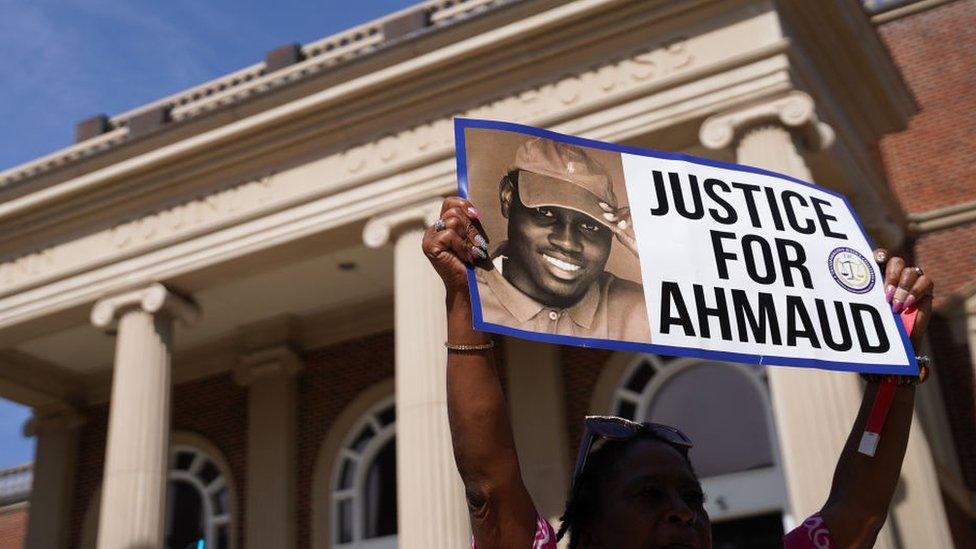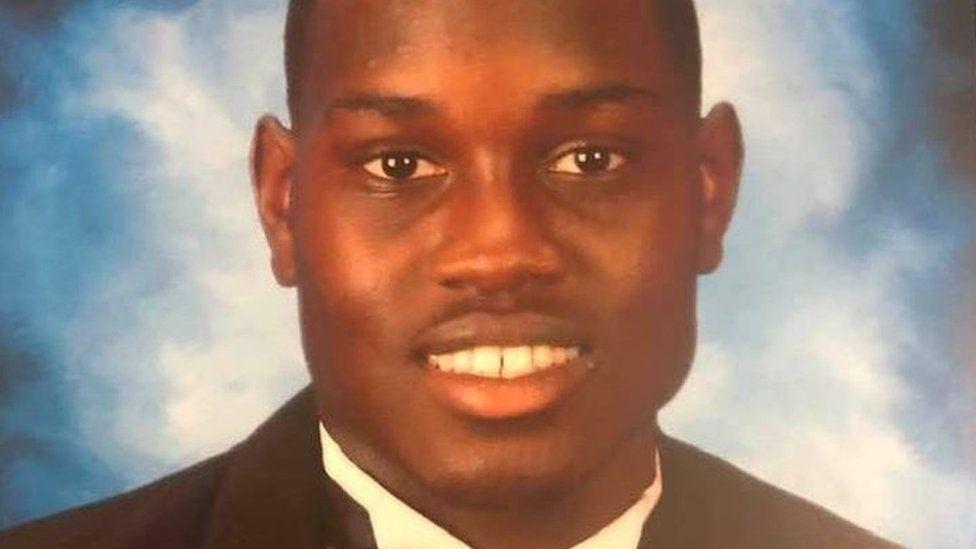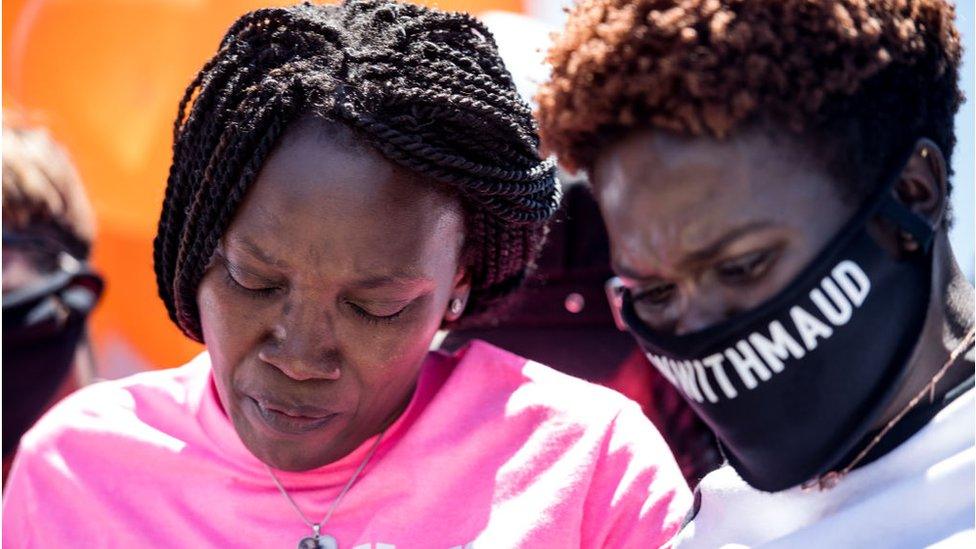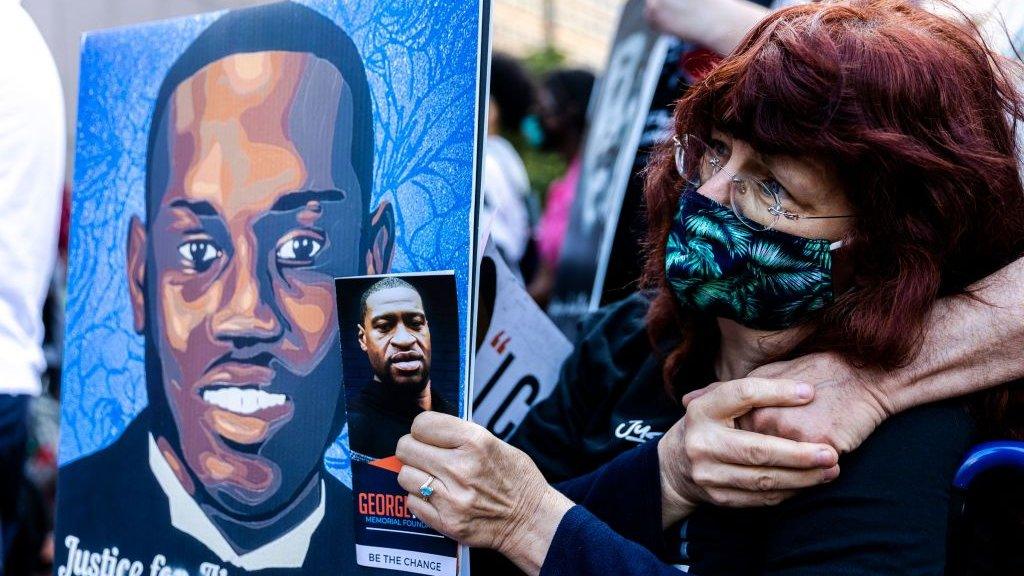Ahmaud Arbery: Jury finds killers guilty on federal hate crimes charges
- Published

A jury found the three defendants guilty on all federal charges
Three white men convicted of killing a black man in the US state of Georgia have been found guilty of federal hate crimes.
Jurors found the defendants targeted Ahmaud Arbery, 25, because of his race.
Gregory McMichael, 66, his son Travis, 36, and their neighbour, William Bryan, 52, had already been found guilty last year of Arbery's murder.
Tuesday's verdict was over a separate set of federal charges filed by the US justice department.
Arbery was jogging in the coastal city of Brunswick when he was confronted and shot dead by the three men in February 2020.
The jurors in this latest trial - a panel of eight white people, three black people and one Hispanic person - considered five separate federal charges and found the defendants guilty on every count.
The first two involved federal hate-crime statutes, and charged the three men with using force and threats to deprive Arbery of his right to use a public street because of his race. The third count charged the men with kidnapping.
The McMichaels also faced firearms charges. Travis McMichael was convicted of discharging a shotgun and his father was convicted with brandishing a revolver.
They may be sentenced to life in prison - in addition to the life sentences they received in January for Arbery's murder.
During closing arguments on Monday, lawyers for the three defendants argued that the men had pursued Arbery because they believed he was involved in criminal activity - not for any racially motivated purpose.
"Would Travis McMichael have grabbed a gun and done this to a white guy?" asked defence lawyer Amy Lee Copeland at trial. "The answer is yes."
But the jurors accepted the prosecution's argument that the McMichaels and Bryan were driven by "racial assumptions, racial resentment and racial anger".
At a news conference later on Tuesday, US Attorney General Merrick Garland said the justice department would use its resources to "confront unlawful acts of hate".
"No-one in this country should have to fear the threat of hate-fuelled violence," he said, adding "no-one should fear that if they go out for a run they will be targeted and killed because of the colour of their skin".
A lawyer for William Bryan declined to comment when reached by the BBC and lawyers for the McMicheals did not return a request for comment.

An end to the family's fight for justice
Chelsea Bailey, BBC News
I spent weeks reporting from Georgia on the killing of Ahmaud Arbery and it's hard to overstate the importance of this guilty verdict for his family - especially because it almost didn't happen.
During the murder trial for the three defendants last year, state prosecutors chose not to focus on evidence that the McMichaels and Bryan pursued and killed Arbery because he was black. Instead, that evidence was to be saved and presented during the federal hate crimes trial.
For weeks jurors heard evidence of all three men's history of "racial resentment" - from the frequent use of racial slurs, to texts and social media posts that urged violence against black Americans.
On Tuesday, that same jury returned a guilty verdict.
In America, it's difficult to secure convictions for hate crimes because evidence of racial motivation has to be presented "beyond a reasonable doubt". And what constitutes "a reasonable doubt" can often be subjective.
In fact, Georgia didn't pass a state hate crimes law until after Arbery was killed in 2020. Wednesday will mark the second anniversary of his murder, and an end to his family's fight for justice.
Speaking after the verdict was announced, Arbery's mother, Wanda Cooper-Jones, reiterated how important it was that the world now knows her son was killed because he was black.
"We got a victory today but there's so many families out there who don't get victories," she said.
Related topics
- Published7 January 2022

- Published13 May 2020

- Published22 November 2021
